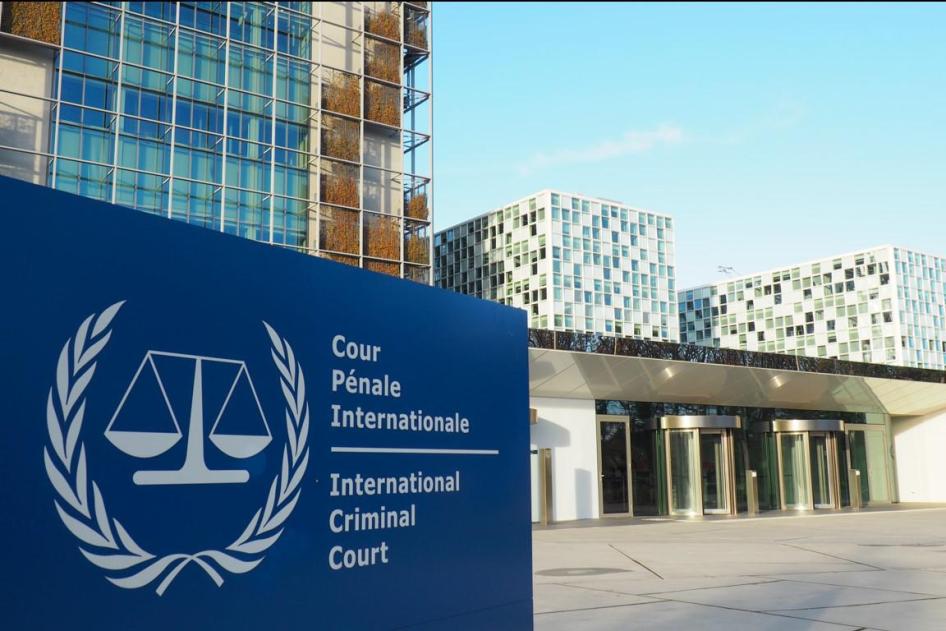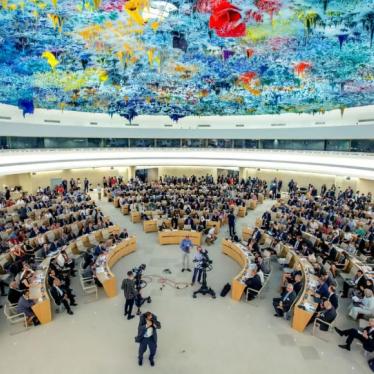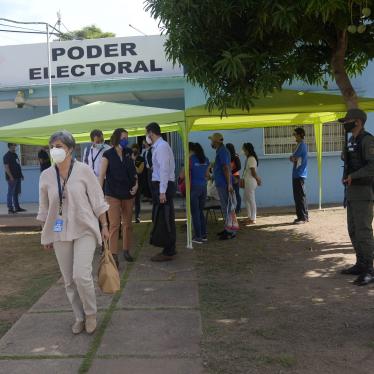(The Hague) – In light of the Venezuelan authorities’ attempt to obstruct accountability for alleged crimes against humanity, the International Criminal Court (ICC) prosecutor’s signal that he intends to move forward with his investigation sends an important message to victims, Human Rights Watch said today.
On April 15, 2022, Venezuela asked the ICC prosecutor, Karim Khan, to defer his office’s investigation into possible crimes against humanity, alleging that domestic authorities were already investigating these crimes. On April 20, Khan notified a panel of ICC judges of Venezuela’s request. In the same filing, he indicated that his office would soon ask the judges to reject the request. The investigation is on hold until the judges rule on Khan’s forthcoming request.
“The ICC prosecutor’s expressed intention to proceed with his investigation, pending judicial approval, is a positive sign,” said Tamara Taraciuk Broner, acting Americas director at Human Rights Watch. “Moving forward, it’s essential for the ICC prosecutor to meaningfully engage with victims, affected communities, and the civil society groups seeking justice for Venezuelans’ suffering.”
Khan’s recent trip to Caracas raised concerns among civil society given that he primarily met with government officials and held no meetings with victims and affected communities.
During the visit, he announced he would establish an in-country office. It is essential for the ICC to use its presence in Caracas to pursue solid investigations into the abuses allegedly committed by Venezuelan authorities, including responsibility along the chain of command, Human Rights Watch said.
Venezuela’s April 15 request, following a January extension of the deadline to ask for a deferral, was based on article 18(2) of the ICC treaty, which allows countries to seek a deferral of an ICC investigation when they can show that they are already investigating or have investigated crimes under the court’s jurisdiction. The ICC is a court of last resort, which steps in only when national courts cannot or will not investigate and, as appropriate, prosecute the most serious international crimes.
Venezuelan authorities asserted that they had the “genuine will” to investigate abuses in 124 cases on which the ICC Prosecutor’s Office had previously asked for information. Of these, 116 are in preliminary investigation, five in the trial phase, and only three cases have resulted in convictions in Venezuela, they said.
Venezuela’s judiciary has failed to adequately investigate widespread abuses despite compelling evidence, and impunity for human rights abuses remains the norm, Human Rights Watch said. Recent measures to reform Venezuela’s justice system are not adequate to address the profound lack of judicial independence in the country, and may even aggravate it.
Since the late President Hugo Chávez and his supporters in the National Assembly carried out a political takeover of Venezuela’s Supreme Court in 2004, the judiciary has stopped functioning as an independent branch of government. Supreme Court justices have openly rejected the principle of separation of powers and have consistently upheld abusive policies and practices. Under Venezuelan law, the Supreme Court plays a critical role in the appointment and removal of lower court judges, so the lack of judicial independence at the top has trickled down to the entire judiciary.
Venezuela’s National Assembly, controlled by Maduro government supporters, approved on January 18 a revision to the Organic Law of the Supreme Court of Justice. It requires appointing an entirely new Supreme Court, made up of 20 justices – down from 32.
The process to select the new justices is to be carried out by a nominating committee consisting of 21 members, including 11 legislators and 10 representatives from various sectors of society. The 11 legislators, elected in December 2020 National Assembly elections of widely disputed legitimacy, select the other 10 members. The Inter-American Commission on Human Rights has said that the elections did not meet the minimum conditions needed to be considered free or fair.
Legislators allied with the ruling party have historically helped it undermine judicial independence. Their leading role in the new nominating committee would seriously undermine the credibility of the selection process and raises concerns regarding its ability to select independent candidates, Human Rights Watch said.
The Venezuelan constitution allows for only one 12-year term for Supreme Court justices. However, members of the current Supreme Court, which has failed to act as a check on executive power and has issued rulings that undermine basic rights to support government interests, may be reelected under the new law.
The Inter-American Commission on Human Rights has said that it is preferable not to allow for discretionary reelection or ratification of justices, since there is a “risk that he or she will behave in a manner to curry favor with the authority in charge of this decision.”
On November 3, 2021, Khan announced his decision to open an investigation in Venezuela. He also signed a letter of understanding with Venezuelan authorities, in which the government agreed to “adopt all necessary measures to ensure the effective administration of justice.” Khan’s predecessor had previously concluded in June 2021 that “the authorities are unwilling genuinely to investigate and/or prosecute such cases” because “domestic proceedings have been undertaken or national decisions made for the purpose of shielding persons from criminal responsibility … and/or domestic proceedings have not been conducted independently or impartially, meaning that they have been conducted in a manner which is inconsistent with an intent to bring the person concerned to justice.”
In its recent filing, the ICC prosecutor stated that his office has committed to “supporting and actively engaging” with domestic authorities “to undertake relevant and genuine proceedings in relation to the crimes which are alleged to have occurred,” but the complementarity assessment cannot be “prospective and speculative, on the basis of facts that may occur in the future.” He was referring to the principle of complementarity, under which the ICC will step in only when national courts cannot or will not investigate and, as appropriate, prosecute the most serious international crimes.
He argued that the materials presented by Venezuela to substantiate its request for deferral had already been reviewed by his office, and “no new information appears to have been submitted that would warrant revisiting its prior determination.”
The ICC currently has 17 situations under investigation. There is a widening gap between the ICC prosecutor’s workload and available resources. Recent efforts have been made by some member countries to address this mismatch by providing Khan’s office with voluntary contributions and personnel. This has raised concerns over the sustainability of this funding model.
“ICC member countries need to ensure that the court has sufficient means and political backing to do its vital work on behalf of victims of grave abuses in Venezuela and elsewhere,” Taraciuk Broner said. “In the absence of genuine domestic efforts to investigate serious crimes, the ICC investigations remains the only credible avenue for justice.”









